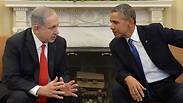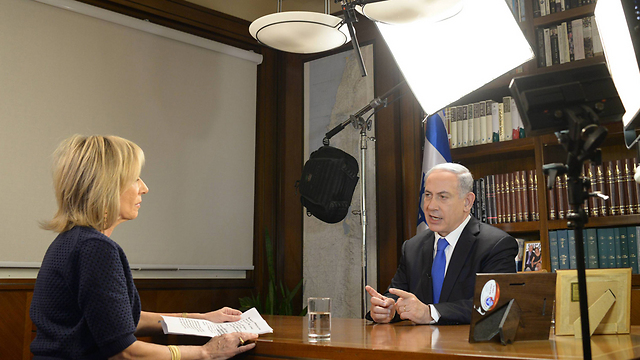
Obama congratulates Netanyahu, stresses commitment to two-state solution
After election spat, leaders agree to continue consultations on 'difficult path forwards to resolve the Israeli-Palestinian conflict'; J'lem diplomatic sources say US 'must not impose a deal on Israel that jeopardizes the safety of Israelis'.
WASHINGTON – President Barack Obama called Prime Minister Benjamin Netanyahu on Thursday to congratulate him on his reelection, while stressing US commitment to a two-state solution in Israel after Netanyahu attempted to backtrack from hard-line statements during his election campaign against the establishment of a Palestinian state.
In the call, the US president "reaffirmed the United States’ long-standing commitment to a two-state solution that results in a secure Israel alongside a sovereign and viable Palestine," a statement issued by the White House said.
The call came as the White House continued to push back against Netanyahu's pre-election rejection of a two-state solution to Palestinian-Israeli peace.
The White House said that "the President and the Prime Minister agreed to continue consultations on a range of regional issues, including the difficult path forward to resolve the Israeli-Palestinian conflict."
Obama also "emphasized the importance the United States places on our close military, intelligence, and security cooperation with Israel, which reflects the deep and abiding partnership between both countries."
Following the exchange, political officials in Jerusalem said the US "must not impose a deal on Israel that jeopardizes the safety of the citizens of Israel", and that instead of looking for excuses to put pressure on Israel – the international community should "put pressure on Abbas, who has run away from the negotiating table, and coordinates steps against Israel at the International Criminal Court in the Hague while he is in an alliance with the Hamas terrorist organization."
During the phone call, the president also referred to negotiations over Iran's nuclear program, and "reiterated that the United States is focused on reaching a comprehensive deal with Iran that prevents Iran from acquiring a nuclear weapon and verifiably assures the international community of the exclusively peaceful nature of its nuclear program."
Sounding a different note earlier Thursday, the White House delivered a fresh rebuke against the Israeli leader and signaled that Washington may reconsider its long-standing policy of shielding Israel from international pressure at the United Nations.
"I haven't changed my policy. I never retracted my speech in Bar-Ilan University six years ago calling for a demilitarized Palestinian state that recognizes the Jewish state," Netanyahu said in an interview with MSNBC two days after winning a bitterly contested Israeli election.
"What has changed is the reality," Netanyahu said, citing the Palestinian Authority's refusal to recognize Israel as the homeland of the Jewish people and the Hamas militant group's continued control of the Gaza Strip.
Shortly after Netanyahu's interview aired, US officials made clear they were not buying it. The White House warned there would be "consequences" for Israel as the Obama administration re-evaluates its Middle East diplomatic strategy and monitors the formation of Netanyahu's new ruling coalition.
"He walked back from commitments that Israel had previously made to a two-state solution," White House spokesman Josh Earnest told reporters. "It is cause for the United States to evaluate what our path is forward."
The harsh US response signaled that US-Israeli relations, already at their lowest point since President Barack Obama took office, could deteriorate even further.
Among the most serious risks for Israel would be a shift in Washington's posture at the United Nations. The United States has long stood in the way of Palestinian efforts to get a UN resolution recognizing its statehood, including threatening to use its veto, and has protected Israel from efforts to isolate it internationally.
In the interview on MSNBC, Netanyahu said: "I don't want a one-state solution. I want a sustainable, peaceful two-state solution. But for that, circumstances have to change," appearing to back away from comments he made during the Israeli election campaign that drew heavy US criticism.
In the interview, the prime minister also affirmed his country's strong ties with the United States on Thursday after tensions in the run-up to his election victory, saying Israel has "no greater ally."
"There are so many areas where we must work together with the United States," Netanyahu said in an interview with NBC. "America has no greater ally than Israel and Israel has no greater ally than the United States."
Earlier Thursday, House Speaker John Boehner had mocked the Obama administration's chilly reaction to the Israeli prime minister's election victory.
Asked by a reporter about the administration lukewarm response to Netanyahu's win, Boehner, a Republican, said, "Lukewarm?" and laughed heartily.
News agencies contributed to this report.











